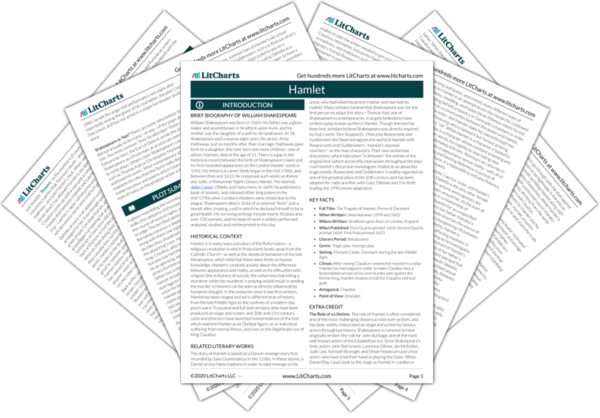Summary
Analysis
Hamlet follows the ghost as it leads him along, but soon grows tired. He orders the ghost to speak to him, refusing to follow it any farther. The ghost assents and turns to speak to Hamlet. The ghost tells the prince that it is nearly time for it to return to purgatory, but before it goes, it has something important to say. Hamlet promises to listen well. The ghost makes Hamlet swear to seek revenge for what the ghost is about to tell him, and Hamlet urges the ghost to go on.
Before the ghost makes clear its identity or its purpose, even, it demands vengeance from Hamlet—and Hamlet agrees. This underscores the important of revenge and honor in Hamlet’s society: it comes before anything else.
Themes
Quiz
Test Yourself
The ghost tells Hamlet that it is indeed the spirit of his father. He begins speaking of the horrors of purgatory, but laments that everything he wants to say cannot be told to “ears of flesh and blood.” The horrified Hamlet listens, rapt, as the ghost urges him to seek revenge for the late king’s “foul and most unnatural murder.” Hamlet urges the ghost to tell the tale of the king’s murder as quickly as it can, so that he can immediately go and get revenge.
Hamlet seems determined to get vengeance for the ghost of his father as quickly as he can—an impulse that will soon be flattened as Hamlet starts actually reckoning with the demands and moral implications of revenge.
Themes
Quiz
Test Yourself
The ghost tells Hamlet that though everyone at court has been told that the king died after being bitten by a serpent while sleeping in the orchard, in reality, “the serpent that did sting thy father’s life now wears his crown.” In other words, the ghost confirms that the “incestuous” and “traitorous” Claudius killed the king by pouring poison in his ears while he slept in the garden. The ghost begs Hamlet not to let Claudius get away with murder—or turn the throne of Denmark into “a couch for luxury and damnèd incest.” The ghost charges Hamlet to avenge him before vanishing. Though the ghost is gone, Hamlet vows aloud to do all the ghost has asked of him.
The ghost uses strong language as it rails against Claudius’s lustful and obscene designs on both the throne and Gertrude, wholeheartedly confirming Claudius’s immorality. It uses an image of a traitorous serpent which invokes the biblical association of snakes with Satan, thus hinting at the Christian morality that underpins Elsinore. This religious undertone is important because it adds deeper context to Hamlet’s struggle to parse out the morality of revenge throughout the play. Hamlet will parrot this specific language later on, as his fury with both Claudius and the queen continues to grow.
Themes
Literary Devices
Quiz
Test Yourself
Horatio and Marcellus at last catch up with Hamlet and breathlessly ask him what the ghost had to say. Hamlet is reluctant to tell them, though, for fear that they’ll betray his secret. Hamlet tells Horatio and Marcellus not to ask him any more about what the ghost said—and not to tell anyone in Denmark about what they’ve seen the last several nights. Both men swear their secrecy. Hamlet asks them to swear upon his sword. When Marcellus protests that they’ve already sworn, the voice of the ghost calls out, demanding the men swear secrecy again. Horatio and Marcellus hastily agree to lay their hands upon Hamlet’s sword and swear.
Just as the ghost has demanded blind allegiance and swift action from Hamlet, so too does Hamlet demand total loyalty and secrecy from his friends. As the ghost reappears to back up Hamlet’s demands, it becomes clear that the ghost can show up any time it likes—and wants to reinforce just how hungry it is for vengeance.
Themes
Literary Devices
Quiz
Test Yourself
Get the entire Hamlet LitChart as a printable PDF.

Hamlet invites Horatio and Marcellus to touch his sword and swear that no matter how strangely Hamlet acts in the coming days—and he may, he predicts, begin acting very strangely—they must not let on that they know anything about the ghost or his visit with Hamlet. The ghost calls out again for the men to swear to Hamlet’s demands. Hamlet urges the ghost to rest, and laments that he must be the one to set his father’s unfinished business right. Satisfied with Marcellus and Horatio’s vows of loyalty, Hamlet urges them to follow him back to the castle.
Hamlet’s madness is, and has long been, the subject of much scrutiny as the play has been studied throughout the years. This passage shows that Hamlet may already be planning to play up the existential unrest he’s already feeling in order to disguise his investigation of Claudius and his hunger for vengeance—proving that Hamlet’s madness begins, at least, as a cover.
Themes
Quiz
Test Yourself












